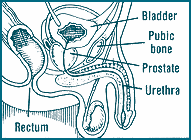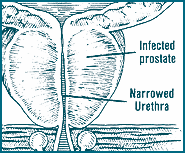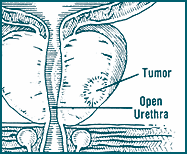Prostate Cancer Information
It is estimated that one out of every five American men will develop prostate cancer. Prostate cancer is the most common cancer among men (excluding skin cancers). It accounts for 43 percent of all male cancers. Despite these startling facts, prostate cancer does not have to be life threatening. It is one cancer that is highly treatable when detected early in its course. With early detection, the chances of recovery from prostate cancer are high. Whether or not you have symptoms, the American Cancer Society and the American Urologic Association advise that every man over the age of 50 should have a yearly prostate exam.

Where Is The Prostate?
Your prostate is a male sex gland that is located between the pubic bone and the rectum. It is about the size and shape of a walnut, and produces a portion of semen, the thick fluid that contains sperm.
Beginning at about age 40 – 45, the prostate gland frequently begins to enlarge, squeezing the urethra and interfering with the passage of urine. This enlargement of the prostate is most often due to benign (non-cancerous) growth, called Benign Prostatic Hyperplasia or BPH.

Symptoms Of Prostate Enlargement
Symptoms of prostate enlargement include:
- Weak or interrupted flow of urine
- Difficulty in starting urination
- Need to urinate frequently, especially at night
- Blood in the urine or semen
- Painful or burning urination
- Pain in the back, hips or pelvis
Your prostate gland can also become infected or inflamed (prostatitis) and produce similar difficulties with urination. If you are experiencing any difficulties with urination, or have had any of the symptoms of prostate enlargement, it is critical that you have your prostate gland checked.
Many patients have prostate cancer and are completely unaware of it. They may not experience symptoms, and urinate in a normal fashion. Prostate cancer tends to be a relatively slow growing cancer that usually arises in the outer portions of the prostate gland, where it may grow to a considerable size before causing any noticeable problems.

Evaluating Your Prostate
In order to thoroughly evaluate your prostate gland, the physicians at Advanced Urology Institute start with a physical examination to make a preliminary diagnosis. Oftentimes, this will be performed in conjunction with the collection of blood and urine specimens. The physicians may utilize a variety of prostate examination methods to evaluate your prostate.
In the traditional method of prostate examination, the digital rectal examination, the physician inserts his finger into the rectum to feel the prostate. Only the posterior rim of the prostate tissue can be examined this way. Ultrasound can examine the prostate in areas where the physician’s finger cannot. Ultrasound uses sound waves to create a “three dimensional” picture of the internal structure of the prostate. The Transrectal Prostate Ultrasound examination can quickly and easily perform a tissue sample, or biopsy, if a suspicious area is found.
A blood test, the Prostate Specific Antigen (PSA) has been shown to aid in the detection of prostate cancer. PSA is a chemical produced only by the prostate gland. Anything that produces an enlargement of the prostate gland (benign enlargement, inflammation or cancer) may lead to higher levels of PSA in the blood. Although the PSA test is a valuable tool, it cannot be used alone to search for prostate cancer. A thorough evaluation, including a digital rectal exam and possibly a prostate ultrasound, are required in addition to the PSA.
Prostate Cancer – Choosing The Right Treatment For You
If a biopsy of the prostate indicates the presence of prostate cancer, further tests are necessary to determine the extent of the disease. The results of further evaluation identify the type of cancer cells, as well as the location and extent of the cancer. This information, along with other factors, such as your general health, age, and medical history, will help your physician at Advanced Urology Institute determine the best course of treatment for you.
If prostate cancer is discovered early on, before it has spread beyond the prostate, your chances for living a normal life are excellent. Surgery to remove the prostate and cure the cancer is most often used, but radiation treatments may also be employed.
In advanced cases, the cancer can spread outside the prostate to nearby tissues, involving the bones or lymph nodes. In these cases, the chance for cure decreases. The various options for treating these advanced cases may include surgery, radiation or hormonal therapy.
If you would like more information about prostate cancer, or would like to schedule a prostate evaluation at Advanced Urology Institute. please call (850) 309-0400 or toll free, (800) 689-6678.

